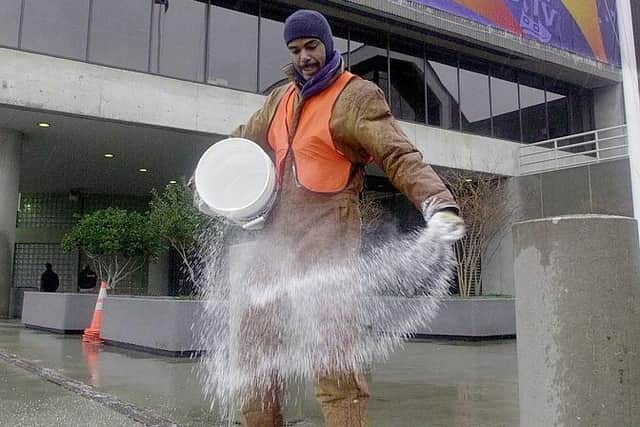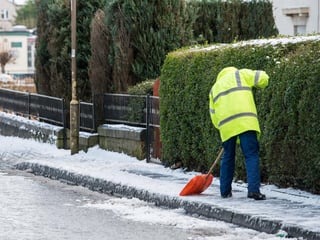Does salt melt ice? If you can use table or rock salt to melt ice and snow - and when it will melt naturally
You’re probably well aware of the fact that salt is used to prevent the build up of ice on roads, pavements and other surfaces that could become dangerous if frosted over.
It works because the freezing point of salty water is lower than that of standard H2O.
Advertisement
Hide AdAdvertisement
Hide AdThe exact freezing point of saltwater depends on how much salt is dissolved into the solution, and the higher the salt content, the lower the freezing point.


Saltwater that's as saturated as it can possibly get (meaning there's no way to dissolve any more salt in it), won’t freeze until it reaches -21.1 degrees Celsius.
But salt used for de-icing by councils and other authorities in the UK predominantly comes from a single mine in Cheshire, and is formulated to work as efficiently as possible, with anti-caking agents and other additives to prevent clumping.
So would a humble dash of table salt have the same effect for de-icing a driveway or the windscreen of your car at home?


Here is everything you need to know.
Will table salt melt ice?
Table salt will indeed help remove ice from surfaces like windscreens, windows or pathways, but just sprinkling it straight on is not the best way to fix your problem.
Instead, you’re better off mixing one tablespoon of salt with two cups of water; apply this solution to your windscreen and the salt will melt the ice.
On windscreens and other glass surfaces, you can then use a plastic ice scraper to remove the ice as it begins to thaw.
Note that a plastic scraper should only be used to remove chunks of ice that are already thawed and should not be pressed against the windscreen as it can scratch the glass if enough force is used.
Advertisement
Hide AdAdvertisement
Hide AdBe wary too that salt can also contribute to the corrosion of metal surfaces, as it aids in the oxidation process and can speed up the appearance of rust.
You’re unlikely to see any adverse effects after one or two de-icings a year, but prolonged use of salt over a long period of time could have detrimental effects.
What about pavements?
On pavements and other surfaces that may be walked or driven upon, using a salt water solution is again the way to go.
Applying salt to already formed ice will only have a noticeable effect once the affected areas have seen some traffic – either boots or tyres treading the salt into the ice – so the first few across it will be subject to icy conditions regardless.
Never use ‘normal’ water on surfaces like pavements, as it may refreeze and make the problem worse.
What else could I use?
If you have any rubbing alcohol to hand, it can make for a great alternative to traditional de-icers – mix one part water to two parts rubbing alcohol, and apply to your windows.
Using a bottle of 70% isopropyl alcohol with a few drops of dish soap can also work wonders too, if you apply it liberally to the glass with a spray bottle.
If you want to prevent the build-up of ice on your windscreen, try spraying your windscreen with a mixture of water and vinegar; while the mixture will not melt ice, it can help ice from forming in the first place if you spray your windscreen with it the night before.
Advertisement
Hide AdAdvertisement
Hide AdRock salt works wonders for de-icing surfaces and pavements, and is usually sold with that specific purpose in mind; check the packaging for instructions on how to use it best.
When will ice melt naturally?
Of course, you could just leave the ice to melt of its own accord, although you could be waiting a while.
How long it will take for the ice to melt through natural causes depends on any number of outside factors, from temperatures to how much direct sunlight the icy area is receiving.
If in doubt, you’re better to take matters into your own hands.

